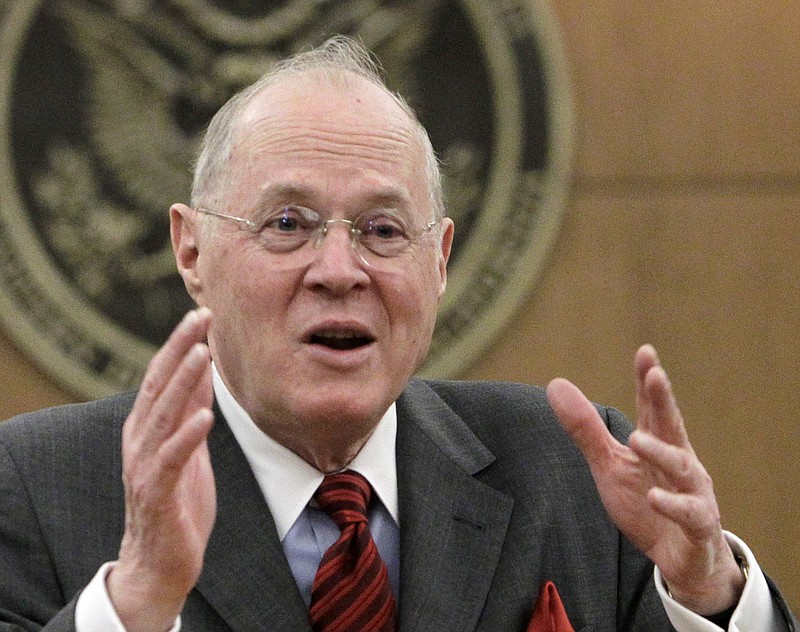Faced with a plum religious freedom case in which a Colorado baker refused to prepare a wedding cake for a gay couple, the United States Supreme Court kicked the can down the road.
In doing so - in basically acting as an appeals court for the Colorado Civil Rights Commission that originally ruled against the cakeshop owner - the Supremes were able to avoid what they most hate, a 5-4 decision.
Instead, in a narrowly focused 7-2 decision, the baker won his case but instead of the case deciding anything definitively, it gave the Colorado commission a rap on the knuckles for its religious hostility.
The decision left, on one side, the cakeshop owner who brought the case, and defenders of religious liberty, and, on the other side, gay rights activists, and those who believe religion has no place in the public square, wondering what had just happened.
In ruling for baker Jack Phillips, Justice Anthony Kennedy wrote that comments by members of the Colorado commission "cast doubt on the fairness and partiality of the Commission's judication of Phillips' case."
In intolerant language all too frequent of those on the left today, especially where religion is concerned, one member of the civil rights commission had compared the baker's refusal to create a cake to Nazi atrocities.
"Freedom of religion and religion has been used to justify all kinds of discrimination throughout history, whether it be slavery, whether it be the Holocaust I mean we can list hundreds of situations where freedom of religion has been used to justify discrimination," Commissioner Diann Rice said in 2014. "And to me it is one of the most despicable pieces of rhetoric that people can use - to use their religion to hurt others."
Leave it to the often silent (at least in oral arguments) Justice Clarence Thomas to add an I-told-you-so to the warning he issued following the 2015 Supreme Court gay marriage ruling that the decision would eventually come into conflict with religious liberty.
"This case," he said Monday, "proves that the conflict has already emerged. Because the Court's decision vindicates Phillips' right to free exercise, it seems that religious liberty has lived to fight another day."
The baker and those who value the protections our Founding Fathers put in the Constitution can celebrate - for a time. After all, the court said the Colorado commission's order must be set aside. In a particularly punitive decision, the commission had said Phillips had to refrain from baking any wedding cakes unless they were made both for same-sex and traditional couples, retrain his employees to accept cake orders from gay couples, and make yearly reports to the commission for two years.
But whether the constitutional right of the free exercise of religion will always trump a state's policing power to favor gay claims for equal treatment is uncertain.
Many in the no-religion-in-the-public-square crowd felt if the Colorado commission had stuck to state law and not been intolerant toward Phillips' religion, the decision might have gone another way. On the other hand, religious liberty adherents believed there is more to be mined in a broader opinion because the majority ruling ignored Phillips' argument that in being forced to bake a cake against his religious views, he was being compelled to speak a message provided by the government or other person with which he strongly disagreed.
The Masterpiece Cakeshop baker, after all, is not intolerant of gays and welcomes them in his store. Indeed, he would have been happy to sell them anything else in the store or design a cake for a different occasion. But just as he, as a custom, does not create a divorce cake, a Halloween cake or an anti-American cake, he did not prepare cakes for same-sex weddings.
His decision to remain true to his faith, in the end, cost him 40 percent of his business and more than half of his employees.
But Justice Kennedy, the same man who wrote the gay marriage decision, having kicked the can down the road with the cakeshop ruling, left the door open for further litigation.
"The outcome of cases like this in other circumstances," he wrote, "must await further elaboration in the courts, all in the context of recognizing that these disputes must be resolved with tolerance, without undue burden disrespect to sincere religious beliefs, and without subjecting gay persons to indignities when they seek goods and services in an open market."
So, the outcome may have a sugary sweet ending for Phillips, who'd had threats of individuals promising to shoot him in the head or kill him with a machete, but the Constitutional principle of freedom of speech on this issue will be back in the laps of the Supremes before the icing melts on this victory. Perhaps when it does, even if it's a hated 5-4 decision, it will be definitive.
